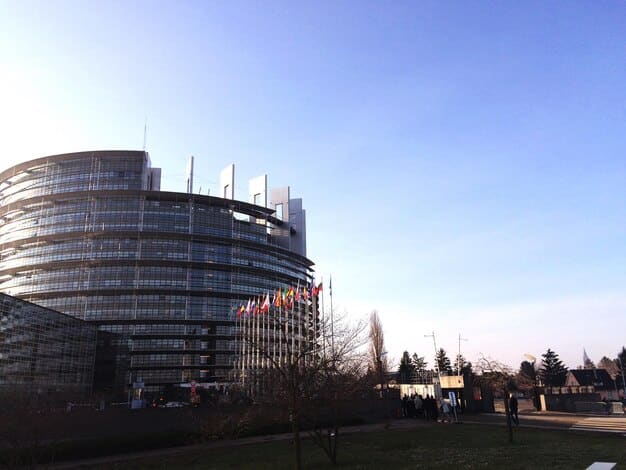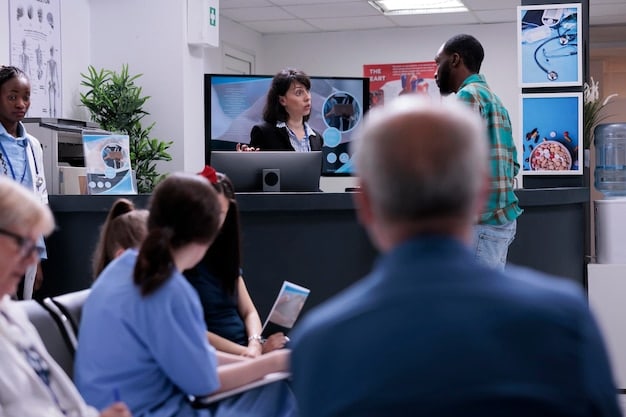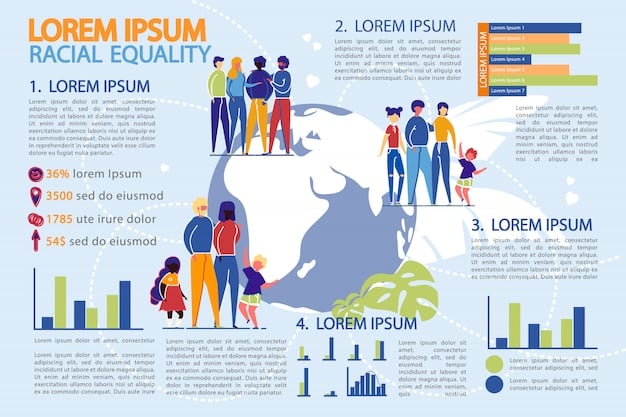The US and WHO: Navigating Global Health Crises in 2025

The US and the World Health Organization (WHO) will face critical decisions in 2025 regarding cooperation on global health crises, balancing national interests with international responsibilities in an evolving geopolitical landscape.
The relationship between the US and the World Health Organization: Navigating Global Health Crises in 2025 will face complex challenges and opportunities. Balancing national interests with global health security will be paramount.
The Evolving US-WHO Relationship in 2025
The relationship between the United States and the World Health Organization (WHO) is pivotal for global health security. In 2025, this relationship will continue to evolve, shaped by past experiences and future challenges.
Understanding the dynamics between the US and WHO requires examining their shared history and the current geopolitical landscape. This will allow for anticipating potential collaborations and conflicts.
Historical Context of US-WHO Collaboration
The US has been a long-standing supporter of the WHO, contributing significantly to its funding and programs. This support has been crucial in addressing global health issues.
- The US played a key role in the WHO’s establishment in 1948.
- Significant US contributions have supported disease eradication programs.
- US experts have been instrumental in shaping WHO policies.
Geopolitical Factors Influencing Cooperation
Geopolitical tensions can impact the US-WHO relationship. Shifts in global power dynamics and political ideologies can influence cooperation.
- Rising nationalism may lead to reduced multilateral engagement.
- Great power competition could undermine collaborative efforts.
- Differing views on health priorities can create friction.

The evolving relationship will demand a keen understanding of historical context and geopolitical influence. This understanding will create stronger bonds between the two entities, allowing better cooperation in the future. As the relationship grows, both parties must remember previous lessons and implement new practices to achieve health security.
Future Pandemic Preparedness
Pandemic preparedness is a critical area where the US and WHO must collaborate closely. Learning from past pandemics is helping both entities create a more unified and solid front.
Looking ahead to 2025, strengthening global health security will be essential. This would involve improving surveillance systems, response mechanisms, and international coordination.
Strengthening Global Surveillance Systems
Early detection of outbreaks is crucial for effective pandemic response. Investing in robust surveillance systems can help identify potential threats.
- Improving data collection and analysis capabilities.
- Establishing real-time information sharing networks.
- Training healthcare workers to identify novel pathogens.
Enhancing Rapid Response Mechanisms
Quick and coordinated responses are essential to contain outbreaks. Developing rapid response mechanisms can mitigate the impact of pandemics.
- Creating stockpiles of essential medical supplies.
- Developing surge capacity in healthcare systems.
- Streamlining regulatory processes for vaccine and drug development.
The collaboration of the US and WHO in pandemic preparedness will be a large factor in whether future breakouts become worldwide pandemics. Strengthening global surveillance systems and enhancing rapid response mechanisms will be key. Implementing these practices will contribute to the creation of a safer and healthier world.
Funding and Resource Allocation
Funding and resource allocation are vital components of the US-WHO partnership. Ensuring sustainable funding for global health initiatives is essential for achieving health security.
In 2025 and beyond, addressing financial challenges and optimizing resource use will be a priority. This would involve exploring innovative financing mechanisms and enhancing transparency.
Addressing Financial Sustainability
The WHO relies on contributions from member states and other donors. Addressing financial sustainability is crucial for its long-term effectiveness.
- Increasing member state contributions to the WHO budget.
- Diversifying funding sources through partnerships with foundations.
- Advocating for increased global health funding from governments.
Optimizing Resource Utilization
Efficient resource allocation is essential to maximize the impact of global health programs. Optimizing resource utilization can improve health outcomes.
- Implementing evidence-based resource allocation strategies.
- Improving transparency and accountability in financial management.
- Investing in cost-effective interventions.

Funding and resource allocation are critical to the US-WHO partnership. Addressing financial stability and optimizing resource use will be a priority. These objectives will create a cost effective and more impactful global health initiative.
Global Health Governance and Leadership
Global health governance and leadership are essential when addressing worldwide health concerns. The US and WHO play vital roles in shaping the global health agenda. These bodies have the responsibility to guide the rest of the world.
In 2025, these roles will entail promoting cooperation, accountability, and inclusiveness. These entities would be key to promoting a coordinated global response against health emergencies.
Promoting Cooperation and Coordination
Effective global health governance requires cooperation and coordination among multiple stakeholders. Promoting these values can lead to better health outcomes.
- Strengthening interagency collaboration at the national level.
- Enhancing coordination between international organizations.
- Facilitating information sharing and knowledge exchange.
Strengthening Accountability and Transparency
Accountability and transparency are vital for building trust in global health governance. Strengthening these aspects can improve the effectiveness of health programs.
- Establishing mechanisms for monitoring and evaluation.
- Promoting transparency in decision-making processes.
- Ensuring that resources are used effectively and efficiently.
The importance of global health governance and leadership for addressing worldwide health concerns cannot be overstated. Promoting cooperation, accountability, and transparency will be essential. Enhancing transparency can improve the effectiveness of worldwide health programs.
Innovation and Technology in Healthcare
Innovation and technology are transforming healthcare and offering new opportunities for global health improvements. The US and WHO can leverage these advancements to address health challenges.
In 2025, promoting the development and adoption of innovative technologies will be focus. This would include telemedicine, digital health solutions, and artificial intelligence.
Advancing Telemedicine Solutions
Telemedicine can expand access to healthcare services, particularly in remote areas. Advancing telemedicine solutions can improve health outcomes.
- Investing in broadband infrastructure to support telemedicine.
- Developing user-friendly telemedicine platforms.
- Training healthcare providers to use telemedicine technologies.
Harnessing Digital Health Technologies
Digital health technologies, such as mobile apps and wearable devices, can empower individuals to manage their health. Harnessing these technologies can improve health outcomes.
- Developing mobile health applications for disease prevention.
- Using wearable devices to monitor health metrics.
- Ensuring data privacy and security in digital health solutions.
Innovation and technology have the potential to transform healthcare and create new opportunities for global health improvements. The US and WHO can leverage these advancements to address the health challenges of today and tomorrow. Investing in telemedicine and harnessing digital health technologies can improve existing health outcomes around the world.
Addressing Health Inequities
Health inequities persist across the globe, with marginalized populations facing disproportionate health risks. The US and WHO can address these disparities through targeted interventions.
In 2025, prioritizing equity in global health initiatives will be essential. This would involve focusing on social determinants of health, strengthening primary healthcare, and addressing health disparities.
Focusing on Social Determinants of Health
Social determinants of health, such as poverty and education, significantly impact health outcomes. Focusing on these determinants can reduce health inequities.
- Implementing programs to address poverty and food insecurity.
- Investing in education and job training opportunities.
- Creating safe and healthy living environments.
Strengthening Primary Healthcare Systems
Primary healthcare is the foundation of a strong health system. Strengthening primary healthcare can improve access to essential services.
- Training and supporting primary healthcare workers.
- Ensuring access to affordable medicines and vaccines.
- Promoting community engagement in healthcare planning.
Health equity must be a priority for these global health care initiatives. Focusing on the social determinants of health and strengthening primary healthcare systems will benefit those in need of these systems.
| Key Point | Brief Description |
|---|---|
| 🤝 Cooperation | Enhancing US-WHO Collaboration for Global Health |
| 🦠 Pandemic Preparedness | Strengthening global surveillance and response systems. |
| 💰 Resource Allocation | Ensuring financial sustainability and effective utilization. |
| 💻 Technology | Leveraging innovations like telemedicine for better Healthcare. |
Frequently Asked Questions
What is the WHO’s primary role in global health?
▼
The WHO serves as the directing and coordinating authority on international health within the United Nations system. It leads global efforts to prevent and control disease outbreaks.
How does the US contribute to the WHO’s mission?
▼
The US provides financial and technical support to the WHO. The country also collaborates on various health programs, and supports research to address global health challenges.
Why is US-WHO collaboration important for pandemic preparedness?
▼
Joint efforts enhance early detection and rapid response. The US and WHO can share data and resources to combat the spread of infectious diseases across the globe.
What are the key areas for improvement in global health governance?
▼
Enhancing cooperation, transparency, and accountability is crucial. This ensures resources are used efficiently and health programs are effective in addressing global health challenges.
How can technology improve global health outcomes?
▼
Telemedicine and digital health solutions can boost access to care. These technologies are especially helpful in remote or underserved areas around the world.
Conclusion
The US and the World Health Organization face a shared responsibility to navigate global health crises in 2025. The US and WHO must cooperate in addressing inequities to make progress in pandemic preparedness, funding, governance, innovation, and health disparities. These measures allow for a healthier and more secure world for all.
Read more content





